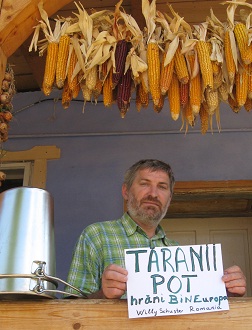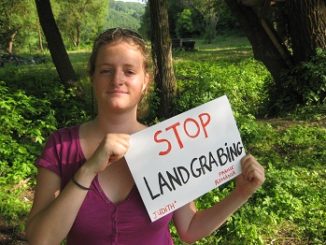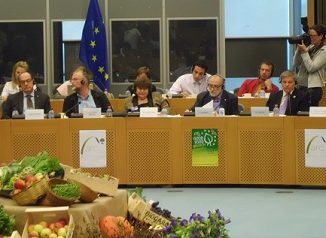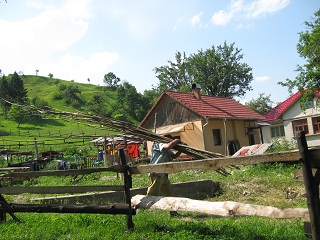In 1999 Willy and Lavinia Schuster left their life in the city to set up a small organic farm in the heart of Transylvania. Almost overnight, it became a sensation. Thirteen years later and the phone has not stopped ringing. As I sit in their home, surrounded by homemade cheeses, the floor covered with rose petals waiting to be stewed into their now trade-mark jam, I can’t help but feel that this is a model of sustainable farming that politicians in Brussels, and those currently gathered in Rio for the UN Conference on Sustainable Development should be considering as a real alternative.

The couple arrived in the village of Mosna with a young family and a strong determination to succeed. Describing the move as a ‘jump into cold water’ – they had no idea of the challenges ahead. And there have been many. However, spurred on by continuous interest from the media, a calendar full of visitors (not to mention those who just drop in), and the growing political role that Willy has come to play, both in Romania and beyond, there is no way the family would ever consider giving up.
When describing their first years in Mosna, Willy Schuster speaks of an overwhelming sense of freedom: a feeling that quickly came under threat when talk of Romania joining the EU began. He explains how he and his wife watched the celebrations on New Year’s Eve 2006-7 with heavy hearts. ‘Everyone, from the government and the press, to farmers and citizens, was expressing the need for growth and an end to small-scale farming. I felt we were the only people who thought peasant farming was still worthwhile.’ At that time, there were almost 7 million peasant farmers in Romania. Today there are 4.7 million, with one man leading their fight.

Following Romania’s accession to the EU, Willy became a self-educated expert on European agricultural policy. Studying policy documents and regulations in depth, he was relieved to find exception regulations already in place for small-farmers and direct selling. In autumn 2007, on the same day that the first MEP elections were held in Romania, Willy was inside the European Parliament for a discussion on the Common Agricultural Policy (CAP). With a Romanian flag attached to his rucksack, the only representative from Eastern Europe: the press was interested.
Since then, Willy has gone on to become an important figure for Romanian farmers and a spokesperson in the current debate on the CAP reform. As this reform takes place every 7 years, this is the first time the country has been involved in the decision-making process. However, with a Romanian holding the position of EU Commissioner for Agriculture and Rural Development – Mr Dacian Cioloş – it already has a high profile. Cioloş is popular among civil society in Romania, seen to have a strong grasp of the issues facing peasant farmers. He was the first Agricultural Minister to use the term ‘semi-subsistence’ in a positive way. However, his understanding alone is not enough says Willy: ‘He must be pushed by the people on the street’.
Perhaps a good starting point for this push is EcoRuralis – a social movement supporting the rights of Romanian farmers and peasants. It was hoped that a union could be set up, but as neither of the two professions are officially recognised, this was not possible. EcoRuralis has approximately 100 members, however as many of these members are local leaders; in reality it represents many more.
Willy is co-president of the movement. Describing himself as more radical than some of its members, he thinks Romania should push for a CAP that rewards work ‘done by hand’ and stops land and livelihood grabbing (a growing problem). He wants direct payments to be capped – ideally phased out – saying that ‘subsidies create an addiction’. (Willy recently had his payments taken back after an interview on national radio in which he called the Agricultural Minister at the time a ‘Monsanto Minister’, a subsequent ‘random control’ by the local authorities, and confusion resulting from tree coverage, fields-without-corners and GPS measurement systems…). He also hopes for a greater push for innovation that will enable methods closer to organic farming to be applied to large-scale farms such as milking robots and forest gardening: ‘Simplification is better than sophistication’ he says. Finally, he thinks it is vital that the value of peasant farming becomes quantifiable in terms of the public goods it provides such as clean water, beautiful landscapes and biodiversity.
I asked Willy if any good has come out of Romania joining the EU. He said yes. It has given Romania, as a legitimate actor in the EU, the opportunity to present its farming culture to other Member States – many of which are looking for alternatives. As some countries act to reverse the damage that has already be done, in Romania mistakes can still be avoided. It is high time that Europe listens and that civil society makes some more noise….





